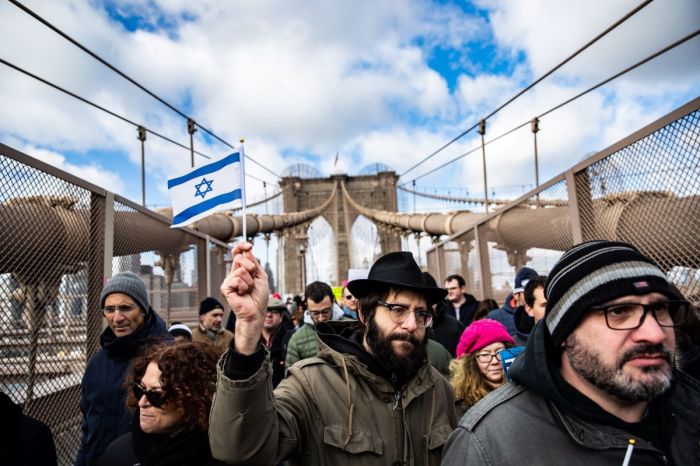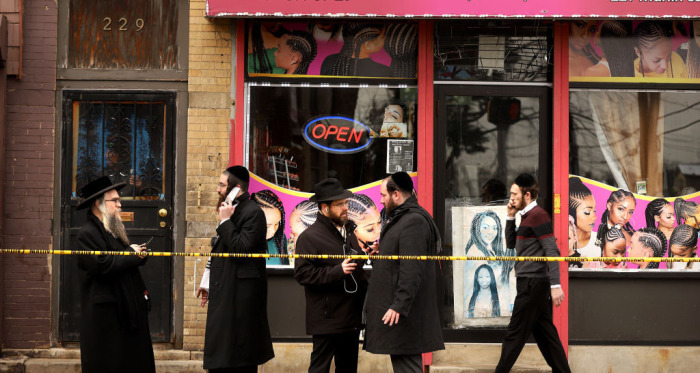How churches and Christians can combat the rising tide of anti-Semitism
To be ‘anti-Semitic would be rejecting Jesus’

Christians in the United States are being urged to use their influence to combat anti-Semitism amid a staggering rise in hate crimes and other incidents targeting Jewish Americans in recent years.
As a leading Jewish civil rights organization reports that 2021 saw violence against Jews reach record levels, followers of Christ have a role to play in fostering acceptance for their Jewish neighbors and pushing back against anti-Semitic conspiracy theories within their spheres of influence, Christian scholars say.
"I think through genuine conversation, we begin to reflect on how our own churches or communities expressed anti-Semitism, either consciously or unconsciously, wittingly or unwittingly," Christian theologian Rev. Lee B. Spitzer, an affiliate professor of church history at Northern Seminary in Illinois, told The Christian Post.
Spitzer, who retired in 2019 as the general secretary of the American Baptist Churches USA, says that many Christians incorrectly conclude that anti-Semitism is a byproduct of Bible-based Christianity or that it's not something that is the Church's responsibility to combat. But he encourages Christians to check their own actions and words they may not know are harmful to the Jewish community.
"Many Christians do and say things that are anti-Semitic not because they intentionally wish to, but because of ignorance," Spitzer explained. "And so, we are to be dislightened about how some of the things we say and do are harmful and hurtful to the Jewish community."
Spitzer, who wrote an article titled "5 Ways Your Church Can Address Anti-Semitism," suggests that the fight against anti-Semitism can be tackled head-on by pastors and Christians with one key thing: friendship.
"Relationships are everything. It's very hard to be prejudiced about a community or a group when you have friends within that group. And I would suggest that people in the Church community need to reach out to their neighbors, their friends, and learn from them, appreciate them," said Spitzer.
"The Church can reach out and stand in solidarity with the Jewish community. For example, there may be a local synagogue or shul, or community center where Churches can create relationships. Churches can invite people from synagogues to their churches for a meal or conversation, for a lecture, or for a way of getting to know one another and for better standing in public. ... It's important for friendship to learn about our commonalities. ... And I think sometimes, we have to hit the streets and march in solidarity to spread awareness."
A rising tide
An audit of anti-Semitic incidents in the United States compiled by the Anti-Defamation League recorded over 2,717 acts of assault, vandalism and harassment nationwide in 2021, the most since ADL began tracking the statistic in 1979. With an average of more than seven anti-Semitic incidents per day, the figure marks a 34% year-over-year increase.
"Attacks against Jewish institutions, including Jewish community centers (JCCs) and synagogues, were up by 61 percent, incidents at K-12 schools increased 106 percent, and incidents on college campuses rose 21 percent," the report states.
"Assaults — considered the most serious incident type because it involves person-on-person physical violence triggered by antisemitic animus — increased 167 percent, jumping to a total of 88 reports in 2021 from 33 in 2020. Incidents of harassment were up 43 percent, and acts of antisemitic vandalism rose 14 percent."
According to a study by California State University in San Bernardino, "Hate crimes [nationwide] surged 46% in 2021, as hotspots like New York City reported a 96% increase, with Jewish Americans remaining the most targeted group." The data, which was not formally published, was compiled from the university's Center for the Study of Hate and Extremism.
According to the Anti-Defamation League, 40% of the hate crimes in New York City targeted Jews, as New York state saw a 24% increase in anti-Semitic incidents. The Empire State continues to lead the nation in anti-Semitic incidents.
On Tuesday, as Jews celebrated their High Holidays, the U.S. House of Representatives Committee on Homeland Security held a congressional field hearing on countering violent extremism, terrorism and anti-Semitic threats in New Jersey, where anti-Semitic incidents rose 25% in 2021, the most recorded in New Jersey by the ADL.
In 2019, New Jersey saw a tragic act of anti-Semitism take the lives of four civilians and injure three others at a kosher deli in Jersey City. Authorities labeled the shooting a hate crime fueled by anti-Semitism.

The Jersey City attack came just months after a shooting killed one and injured three at a synagogue in Poway, California. Months before the Poway shooting in November 2018, 11 were killed in a shooting at a synagogue in Pittsburgh, Pennsylvania.
During Tuesday's hearing, New York Democratic Rep. Ritchie Torres, D-N.Y., declared, "So far, we are losing" the effort to thwart hatred and anti-Semitism.
In a research report released in late May, ADL states that the spike in anti-Semitic incidents has been driven by different factors, including extreme anti-Israel sentiments during the May 2021 Israel-Hamas conflict and "various conspiracy theories that have animated extremists across the state."
The report cites the presence of white supremacists, anti-government extremists, militias, Islamist extremists, violent anti-Zionists and others "who are either based in New York or have targeted the state for an attack."
ADL contends that incidents motivated by anti-Zionist sentiments include assault, arson threats and harassment. Most recently, the Jewish fraternity Alpha Epsilon Pi at Rutgers University in New Jersey was vandalized during the High Holiday of Rosh Hashanah, the second time in one calendar year the fraternity was targeted.
Both political extremes are complicit
Serene Hudson, the director of education at Passages Israel — an organization that spearheads trips to Israel for Christians — told CP that people must be aware that the rise in anti-Semitism can be seen in both political extremes in America. It's not just a Democrat or Republican problem.
This includes but is not limited to "dangerous rhetoric from the right, white nationalists, neo-Nazis and white supremacists" and "anti-Israel rhetoric" from the left.
"On the extreme right, it has to do with anti-Semitic conspiracies, where Jews are blamed for aspiring for world domination," she said. "And then on the extreme left, there is plenty of anti-Israel rhetoric that denies the basic right for the Jewish people to have a homeland."
As a Moody Graduate School alumnus who spent over a decade traveling to Israel annually, Hudson finds that some of the work needed to combat anti-Semitism in various communities should start inside and outside the Church.
"I think that we all need to educate ourselves about the common anti-Semitic conspiracies and understand where they come from. And when we see … accusations or even perceptions directed at Jewish people, we should dig a little bit deeper," Hudson stated.
"We should educate ourselves in understanding that there are many falsehoods that are repeated about Jewish people and talk to our Jewish friends. Ask them: 'Have you experienced anti-Semitism? Do you feel that anti-Semitism has risen in our country?'"
Christians and churches looking to combat anti-Semitic rhetoric in their communities should look to the Bible, she asserted.
"When we look to Scripture, we consider, for example, Mordecai, the uncle of Esther, was a voice of moral clarity for her and for the Persian culture," Hudson said. "And he helped her to stand up against anti-Semitism and the threats against the Jewish people."
Scripture provides Christians with an anchor to better understand what's happening in the world, she added. This can help them with the process of beginning to pray for peace and the protection of the Jewish communities.
"It says in Romans that the Jewish people who were the descendants of Abraham, Isaac and Jacob are loved by the God of the forefathers," Hudson said.
"And so really going back and looking at our source of truth, which is Scripture, which is the Bible, and comparing what it is that God says about His love for His people, against what is being said about the Jewish people can provide better understanding."
Holocaust education in schools and churches is essential to understanding the history of anti-Semitism in the Church dating back to the Church fathers, Hudson said.
"We definitely need more awareness out there. I think if more people knew that there was this uptick in hate crimes against Jewish people, and if we were aware of what's going on in the media on social media, there would be more of a response. But I believe that the news is not getting out there enough," she concluded.





























